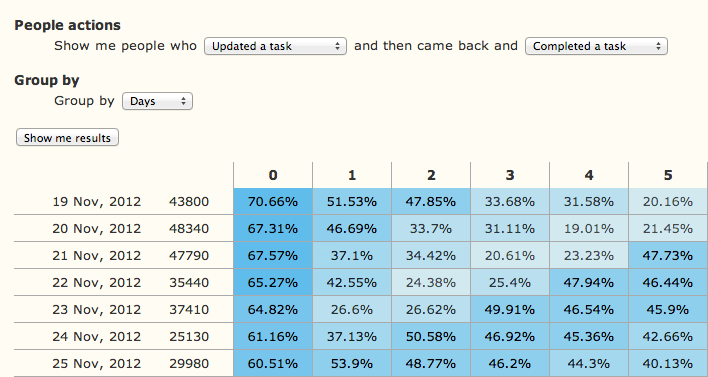NEW! Try out our new standalone bitmapist-server, which improves memory efficiency 443 times and makes your setup much cheaper to run (and more scaleable). It's fully compatiable with bitmapist that runs on Redis.
This Python library makes it possible to implement real-time, highly scalable analytics that can answer following questions:
- Has user 123 been online today? This week? This month?
- Has user 123 performed action "X"?
- How many users have been active this month? This hour?
- How many unique users have performed action "X" this week?
- How many % of users that were active last week are still active?
- How many % of users that were active last month are still active this month?
- What users performed action "X"?
This library is very easy to use and enables you to create your own reports easily.
Using Redis bitmaps you can store events for millions of users in a very little amount of memory (megabytes). You should be careful about using huge ids as this could require larger amounts of memory. Ids should be in range [0, 2^32).
Additionally bitmapist can generate cohort graphs that can do following:
- Cohort over user retention
- How many % of users that were active last [days, weeks, months] are still active?
- How many % of users that performed action X also performed action Y (and this over time)
- And a lot of other things!
If you want to read more about bitmaps please read following:
- http://blog.getspool.com/2011/11/29/fast-easy-realtime-metrics-using-redis-bitmaps/
- http://redis.io/commands/setbit
- http://en.wikipedia.org/wiki/Bit_array
- http://www.slideshare.net/crashlytics/crashlytics-on-redis-analytics
Can be installed very easily via:
$ pip install bitmapist
Setting things up:
from datetime import datetime, timedelta
from bitmapist import setup_redis, delete_all_events, mark_event,\
MonthEvents, WeekEvents, DayEvents, HourEvents,\
BitOpAnd, BitOpOr
now = datetime.utcnow()
last_month = datetime.utcnow() - timedelta(days=30)Mark user 123 as active and has played a song:
mark_event('active', 123)
mark_event('song:played', 123)Answer if user 123 has been active this month:
assert 123 in MonthEvents('active', now.year, now.month)
assert 123 in MonthEvents('song:played', now.year, now.month)
assert MonthEvents('active', now.year, now.month).has_events_marked() == TrueHow many users have been active this week?:
print(len(WeekEvents('active', now.year, now.isocalendar()[1])))Iterate over all users active this week:
for uid in WeekEvents('active'):
print(uid)If you're interested in "current events", you can omit extra now.whatever
arguments. Events will be populated with current time automatically.
For example, these two calls are equivalent:
MonthEvents('active') == MonthEvents('active', now.year, now.month)Additionally, for the sake of uniformity, you can create an event from
any datetime object with a from_date static method.
MonthEvents('active').from_date(now) == MonthEvents('active', now.year, now.month)Get the list of these users (user ids):
print(list(WeekEvents('active', now.year, now.isocalendar()[1])))There are special methods prev and next returning "sibling" events and
allowing you to walk through events in time without any sophisticated
iterators. A delta method allows you to "jump" forward or backward for
more than one step. Uniform API allows you to use all types of base events
(from hour to year) with the same code.
current_month = MonthEvents()
prev_month = current_month.prev()
next_month = current_month.next()
year_ago = current_month.delta(-12)Every event object has period_start and period_end methods to find a
time span of the event. This can be useful for caching values when the caching
of "events in future" is not desirable:
ev = MonthEvent('active', dt)
if ev.period_end() < now:
cache.set('active_users_<...>', len(ev))As something new tracking hourly is disabled (to save memory!) To enable it as default do::
import bitmapist
bitmapist.TRACK_HOURLY = TrueAdditionally you can supply an extra argument to mark_event to bypass the default value::
mark_event('active', 123, track_hourly=False)Sometimes the date of the event makes little or no sense, for example,
to filter out your premium accounts, or in A/B testing. There is a
UniqueEvents model for this purpose. The model creates only one
Redis key and doesn't depend on the date.
You can combine unique events with other types of events.
A/B testing example:
active_today = DailyEvents('active')
a = UniqueEvents('signup_form:classic')
b = UniqueEvents('signup_form:new')
print("Active users, signed up with classic form", len(active & a))
print("Active users, signed up with new form", len(active & b))Generic filter example
def premium_up(uid):
# called when user promoted to premium
...
mark_unique('premium', uid)
def premium_down(uid):
# called when user loses the premium status
...
unmark_unique('premium', uid)
active_today = DailyEvents('active')
premium = UniqueEvents('premium')
# Add extra Karma for all premium users active today,
# just because today is a special day
for uid in premium & active_today:
add_extra_karma(uid)To get the best of two worlds you can mark unique event and regular bitmapist events at the same time.
def premium_up(uid):
# called when user promoted to premium
...
mark_event('premium', uid, track_unique=True)How many users that have been active last month are still active this month?
active_2_months = BitOpAnd(
MonthEvents('active', last_month.year, last_month.month),
MonthEvents('active', now.year, now.month)
)
print(len(active_2_months))
# Is 123 active for 2 months?
assert 123 in active_2_monthsAlternatively, you can use standard Python syntax for bitwise operations.
last_month_event = MonthEvents('active', last_month.year, last_month.month)
this_month_event = MonthEvents('active', now.year, now.month)
active_two_months = last_month_event & this_month_eventOperators &, |, ^ and ~ supported.
Work with nested bit operations (imagine what you can do with this ;-))!
active_2_months = BitOpAnd(
BitOpAnd(
MonthEvents('active', last_month.year, last_month.month),
MonthEvents('active', now.year, now.month)
),
MonthEvents('active', now.year, now.month)
)
print(len(active_2_months))
assert 123 in active_2_months
# Delete the temporary AND operation
active_2_months.delete()If you want to permanently remove marked events for any time period you can use the delete() method:
last_month_event = MonthEvents('active', last_month.year, last_month.month)
last_month_event.delete()If you want to remove all bitmapist events use:
bitmapist.delete_all_events()When using Bit Operations (ie BitOpAnd) you can (and probably should) delete the results unless you want them cached. There are different ways to go about this:
active_2_months = BitOpAnd(
MonthEvents('active', last_month.year, last_month.month),
MonthEvents('active', now.year, now.month)
)
# Delete the temporary AND operation
active_2_months.delete()
# delete all bit operations created in runtime up to this point
bitmapist.delete_runtime_bitop_keys()
# delete all bit operations (slow if you have many millions of keys in Redis)
bitmapist.delete_temporary_bitop_keys()With bitmapist cohort you can get a form and a table rendering of the data you keep in bitmapist. If this sounds confusing please look at Mixpanel.
Here's a simple example of how to generate a form and a rendering of the data you have inside bitmapist:
from bitmapist import cohort
html_form = cohort.render_html_form(
action_url='/_Cohort',
selections1=[ ('Are Active', 'user:active'), ],
selections2=[ ('Task completed', 'task:complete'), ]
)
print(html_form)
dates_data = cohort.get_dates_data(select1='user:active',
select2='task:complete',
time_group='days')
html_data = cohort.render_html_data(dates_data,
time_group='days')
print(html_data)
# All the arguments should come from the FORM element (html_form)
# but to make things more clear I have filled them in directlyThis will render something similar to this:
Please see our guide here
We use Poetry for dependency management & packaging. Please see here for setup instructions.
Once you have Poetry installed, you can run the following to install the dependencies in a virtual environment:
poetry installTo run our tests will need to ensure a local redis server is installed.
We use pytest to run unittests which you can run in a poetry shell with
poetry run pytest- Bump version in
pyproject.toml - Update the CHANGELOG
- Commit the changes with a commit message "Version X.X.X"
- Tag the current commit with
vX.X.X - Create a new release on GitHub named
vX.X.X - GitHub Actions will publish the new version to PIP for you
Copyright: 2012 by Doist Ltd.
License: BSD



